Religion: Religious Leaders Post-1900
Padre Pio (1887-1968)
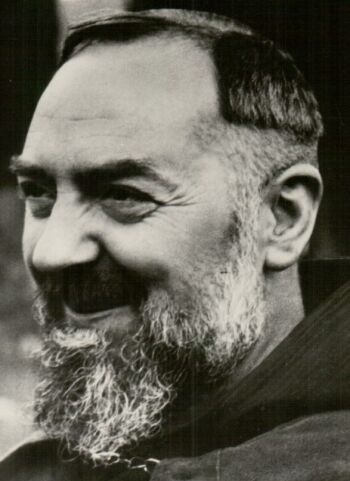
Religion and Branch: Christianity (Catholicism)
Title: Priest, Stigmatist, Saint
Born as Francesco Forgione, Padre Pio was an Italian Capuchin friar, priest, and mystic known for his deep spirituality and exceptional charitable works. He is perhaps best known for bearing the stigmata, which are the wounds of Christ, for over 50 years. These wounds made him a subject of fascination and controversy. Many people believed them to be a sign of his sanctity, while skeptics questioned their authenticity.
Pio was sought after as a confessor and spiritual director, with people traveling from all over the world to attend his masses and seek his guidance in the confessional. He was known for his commitment to the sick and suffering. He played a pivotal role in the establishment of the "Home for the Relief of Suffering" (Casa Sollievo della Sofferenza) in San Giovanni Rotondo, which is now a major hospital and research center.
Apart from the stigmata, Pio reported many other mystical experiences, including bilocation (being in two places at once), prophecy, and healings. These experiences furthered his reputation as a living saint but also brought scrutiny from church officials. Due to the controversies and suspicions surrounding his mystical experiences, Pio faced periods of restriction imposed by church authorities, including being forbidden from saying mass publicly and hearing confessions.
After his death in 1968, Pio's reputation as a holy man continued to grow. He was beatified in 1999 and canonized as a saint by Pope John Paul II in 2002. Today, Saint Pio of Pietrelcina is one of the most popular saints in the Catholic Church, especially in Italy. San Giovanni Rotondo, where he lived and worked, remains a major pilgrimage site, drawing millions of visitors each year.
Pope Paul VI (1897-1978)
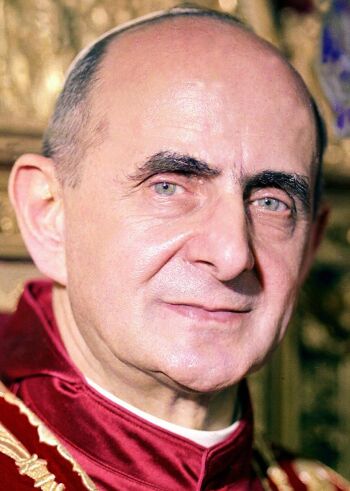
Religion and Branch: Christianity (Catholicism)
Title: Pope
Pope Paul VI was born Giovanni Battista Montini in Lombardy, Italy. He was ordained as a priest in 1920 and served as the head of the Roman Catholic Church and sovereign of the Vatican City State from 1963 until his death in 1978.
Pope Paul VI is perhaps best known for overseeing the majority of the Second Vatican Council (Vatican II), an ecumenical council that introduced substantial reforms in the Catholic Church. Vatican II, which started under Pope John XXIII, was concluded under Paul VI in 1965. The reforms touched nearly every aspect of Church life and had a profound impact on Catholicism in Italy and around the world. A significant outcome of Vatican II was the liturgical reform. Pope Paul VI authorized the use of vernacular languages during mass instead of Latin, making the liturgy more accessible to ordinary believers, including Italians.
Paul VI emphasized dialogue with the contemporary world. His encyclical "Populorum Progressio" focused on human development and the challenges of modern economic structures. In Italy, this resonated with the ongoing social and economic transformations of the period. He was the first pope in modern times to travel extensively outside Italy. His pilgrimages emphasized the universal mission of the Church, but his messages abroad often had implications for Italy as well.
During Paul VI's papacy, Italy experienced increasing secularism, and the historic dominance of the Catholic Church in Italian society was challenged. Paul VI navigated these challenges, emphasizing the spiritual role of the Church in a changing society. Pope Paul VI's encyclical "Humanae Vitae" (1968) reaffirmed the church's stance against artificial contraception, a teaching that generated significant debate both within Italy and internationally.
Paul VI's death in 1978 marked the end of an era. His papacy saw the Catholic Church in Italy, and globally, transition from a more traditional stance to one more engaged with the modern world. He was canonized in 2018 as Pope Saint Paul VI.
Pope John Paul II (1920-2005)
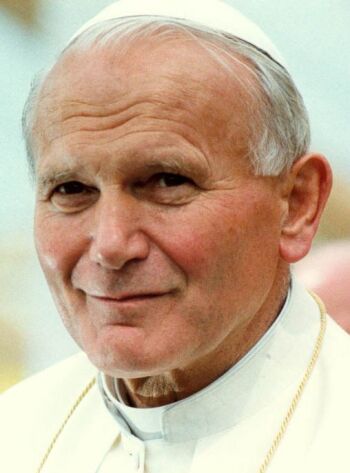
Religion and Branch: Christianity (Catholicism)
Title: Pope, Bishop
Pope John Paul II was born Karol Józef Wojtyła in Wadowice, Poland. He was ordained as a priest in 1946 and served as the head of the Roman Catholic Church from 1978 until his death in 2005. He served as the Bishop of Rome and the sovereign of the Vatican City State, both located in Italy. His papacy, one of the longest in history, spanned more than 26 years, making him a dominant religious figure in Italy and worldwide.
Pope John Paul II emphasized the need for a "new evangelization" and revitalized many aspects of the Catholic Church, drawing large crowds during his public appearances in Italy, especially during his weekly Angelus prayers and World Youth Day celebrations. He was known for his outreach to other religious groups. In Italy, a country with a significant Catholic majority but also diverse religious minorities, his approach fostered better interfaith relationships.
Pope John Paul II played a significant role in the political and social fabric of Italy, emphasizing the importance of family, pro-life issues, and the dangers of secularism. His influence was felt in Italian politics, especially concerning issues related to the family and bioethics. During his papacy, the Catholic Church faced various challenges, including the clerical sex abuse scandal. Pope John Paul's response to these issues had a significant impact on the church's reputation and the faith of many in Italy.
In Italy, John Paul II is remembered not just as a global religious leader but also as a pope who deeply affected the Italian cultural and religious landscape. His emphasis on the universality of the Catholic Church, combined with his personal charisma, left a lasting impact on the Italian Catholic community. He was a monumental figure in the religious history of Italy, shaping Catholic thought, practice, and influence during his lengthy papacy. His teachings and actions continue to reverberate in Italy's religious and cultural spheres. He was canonized in 2014 as Pope Saint John Paul II.
Chiara Lubich (1920-2008)
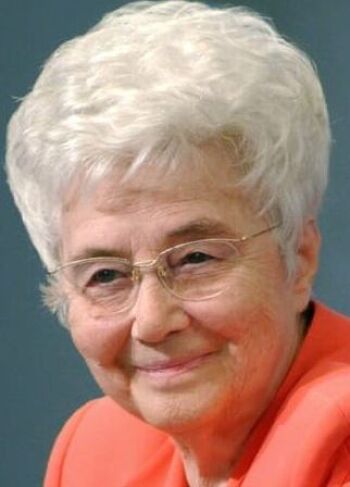
Religion and Branch: Christianity (Catholicism)
Title: Teacher, Author, Founder of Focolare Movement
Chiara Lubich was an influential Italian Catholic laywoman who founded the Focolare Movement (meaning "Hearth" or "Family Fireside") in 1943 during World War II. Emphasizing unity and universal brotherhood, it started in Trent, Italy, amid the devastations of the war, with a small group of women who dedicated themselves to living the Gospel in a radical way. The movement spread rapidly, attracting both laypeople and religious members.
Lubich and the Focolare Movement are well-known for promoting dialogue between different Christian denominations as well as between religions. The movement has been a significant proponent of interfaith understanding and cooperation. It expanded internationally and now has members in more than 180 countries. Members engage in various forms of apostolate, addressing social issues, promoting education, and fostering dialogue.
Lubich's vision of a united world has inspired countless individuals. She received several international awards for promoting peace and interreligious dialogue. The Focolare Movement continues to thrive today, with communities worldwide keeping Lubich's vision alive. Lubich left a profound mark on the religious landscape of Italy and the world through her emphasis on unity, dialogue, and living the Gospel in everyday life. Her work has had a lasting impact on the Catholic Church's approach to ecumenism and interfaith relations.
Don Lorenzo Milani (1923-1967)
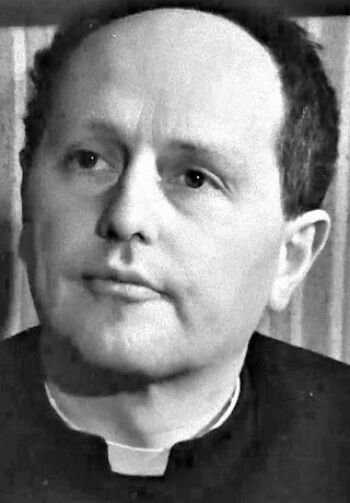
Religion and Branch: Christianity (Catholicism)
Title: Priest, Educator
Don Lorenzo Milani was an Italian Catholic priest who became renowned for his commitment to social justice, education, and advocacy for the poor and marginalized. Throughout his life, he emphasized the Gospel's social dimensions, highlighting the need for the Church to stand with the poor, the oppressed, and the marginalized.
Milani is best known for his work in the small mountain parish of Barbiana in Tuscany, where he founded a school for boys, most of whom were dropouts or deemed failures by the formal educational system. Under his guidance, the students at Barbiana wrote Letter to a Teacher. This was a critique of the Italian educational system, accusing it of perpetuating social inequalities. The book became a sensation and fueled national debates on education and social justice. Milani's radical views often put him at odds with both Catholic Church authorities and the Italian establishment. He faced criticisms and was once moved from one parish due to his teachings, which were seen as too revolutionary by some church leaders.
After his early death from leukemia in 1967, Milani's work and writings gained more widespread recognition. He became an inspiration for many priests, educators, and activists in Italy and beyond, advocating for a church more engaged in social issues and justice. Milani is remembered in Italy as a priest who challenged the established norms and advocated for a more socially engaged form of Catholicism. His emphasis on education as a means of social change and his commitment to the marginalized left a lasting legacy in the Italian religious and social landscape.
Carlo Maria Martini (1927-2012)

Religion and Branch: Christianity (Catholicism)
Title: Cardinal, Archbishop of Milan
Carlo Maria Martini was a prominent Jesuit scholar, biblical expert, and church leader. He was ordained as a priest in 1952, served as the Archbishop of Milan from 1980 to 2004, and elevated to the cardinalate in 1983.
Before becoming Archbishop of Milan, Martini was an esteemed biblical scholar. He served as the rector of the Pontifical Biblical Institute and later as the rector of the Pontifical Gregorian University, both in Rome. As Archbishop of Milan, one of the largest dioceses in the world, Martini was known for his pastoral approach, fostering dialogue with the faithful and often holding public meetings and Bible sessions. He was deeply committed to fostering better relations between different Christian denominations and between religions.
Cardinal Martini was often seen as a leading voice of the progressive wing of the Catholic Church. He emphasized the importance of dialogue between the church and modern society and advocated for a more inclusive and understanding approach on issues like divorce and the role of women in the church. Martini frequently engaged in public discussions about the challenges facing modern society. He was known for his "Conversations in the Cathedral," where he dialogued with believers and non-believers on a range of contemporary issues.
In his later years and especially after his retirement, Martini became more open in his critique of certain aspects of the Catholic Church's direction. For instance, shortly before his death, he commented on the church's need for reform and renewal, describing it as "200 years out of date." While some in the church viewed Martini's positions as too liberal, many admired his intellectual rigor, pastoral sensitivity, and commitment to dialogue. His views and teachings have continued to resonate with those advocating for a more progressive and open Catholic Church.
Abdul Hadi Palazzi (1961 to Present)

Religion and Branch: Islam (Sufism)
Title: Secretary-General of Italian Muslim Assembly, Khalifah for Europe of the Qadiri Sufi Order, Director of the Cultural Institute of the Italian Islamic Community
Born of Italian and Syrian descent, Abdul Hadi Palazzi is an influential figure in the context of Islam in Italy. His unique perspectives on interfaith relations, particularly between Muslims and Jews, have garnered attention both within Italy and internationally. Palazzi holds degrees in Islamic sciences and psychology. He has been the secretary-general of the Italian Muslim Assembly and also served as director of the Cultural Institute of the Italian Islamic Community.
Palazzi is notable for his pro-Jewish viewpoints within Islamic theology. He asserted that the Qur'an supports the right of the Jewish people to the land of Israel. This perspective, which is at odds with many mainstream Islamic views, has made him a prominent figure in interfaith dialogue, particularly concerning the Israeli-Palestinian conflict. Due to his viewpoints, Palazzi has faced criticism and backlash from various Muslim groups. Despite this, he continues to be an advocate for peaceful coexistence and dialogue between different religious communities.
Palazzi has been invited to numerous international forums, symposiums, and interfaith events where he speaks on topics of Islamic theology, the relationship between Muslims and Jews, and the interpretation of Quranic scriptures in the context of the modern world. He represents a distinct voice within the Muslim community, advocating for interpretations of Islam that emphasize coexistence, dialogue, and a particular perspective on the relationship between Islam and Judaism.
Copyright © 1993—2025 World Trade Press. All rights reserved.

 Italy
Italy